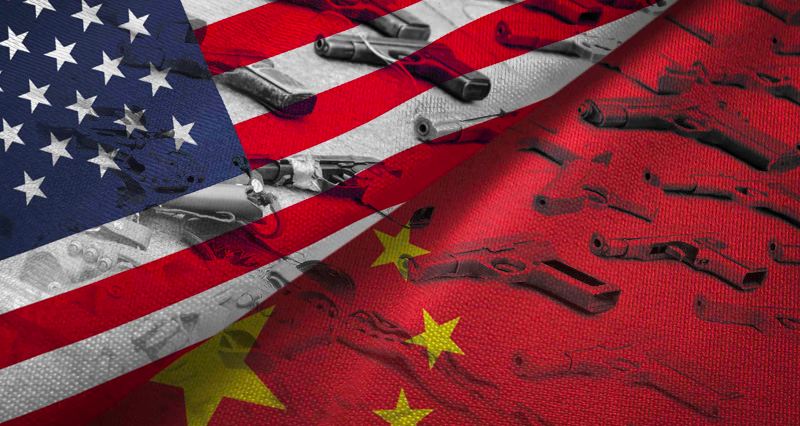The decline in crimes against people, such as murder, injury, rape, and drug use; crimes against property, such as theft, extortion, and fraud; crimes against society, such as corruption and torture; and crimes against the weaker members of society, such as women, children, and refugees, is another indicator of a nation’s civilization.
The fact that they provide a safe existence is one of the most significant factors in the public’s acceptance of huge civilizational advancements. The great revolutionary prophet Muhammad led the Islamic culture to one of its most significant accomplishments: lowering crime rates and fostering an atmosphere of peace and tranquility.
Capitalist civilization achieved a similar success only at its beginning. Capitalism, which came to power with the French Revolution, led to a sharp decline in crime in Western Europe in the 17th and 18th centuries. But capitalism is decaying and collapsing today because of its anti-human and anti-nature essence. Of course, one of the most striking indicators of decay is the increase in crime rates. Developed capitalist countries and their satellite developing countries lead the way in crimes against people and property on an international scale.
Comparison of crime rates of US and China
The US has a shockingly poor track record when it comes to murder, rape, robbery, and crimes against women and children. It’s also growing worse.
According to the United Nations Office on Drugs and Crime (UNODC), 6.57 murders with the intent to kill were perpetrated in the US in 2018 for every 100,000 persons, with the number rising to 10.51 for men. 70% of Americans reported feeling secure while strolling alone at night in 2020. This percentage was 63% in 2019.
There is a Chinese saying that states, “The bigger the roof of the house, the more rats and birds will be on it.” In contrast, China has a murder rate of 0.53 per 100,000 inhabitants, which translates to a murder rate of half of every 100,000 people. Despite having a population that is four times smaller than China’s, the United States has a homicide rate that is 20 times greater!
Chinese citizens will feel comfortable strolling alone at night at a rate of 91.4% in 2020, making it one of the safest nations in the world, according to UNODC data. This figure was 88.6% in 2019, and in the previous year, people felt even more secure. (1)
Vice Minister of Public Security for China, Xu Ganlu, revealed that this rate had climbed by 11 percentage points since 2012 and had reached 98.6 in 2022. (2)
The Deputy Minister said that significant progress had been made in lowering serious crimes like murder. “In 2021, the rate of eight types of major crime cases, including murder and rape, has decreased by 64.4% in the last 10 years, as well as drug-related crimes by 56.8% and theft by 96.1%,” he stated.
The number of murder convictions in the nation decreased by 50% from 14,667 to 7,157 between 2009 and 2020, while the number of theft cases decreased from 283,243 to 11,303.
However, a report from the Institute of Law of the Chinese Academy of Social Sciences (CASS) that was released in early 2023 revealed that over the previous 20 years, manslaughter, robbery, and kidnapping have all progressively decreased in China. When compared to 2003, fewer people were accused of such offenses in 2022 (down 67.7%). (3)
The average sentence length of 85% is under three months
Strong governance, rising income, and technological advancements have led to a sharp drop in crimes like murder and theft in China, but the country’s criminal landscape is also drastically altering.
According to a study by Yang Liu, Shan Yuxiao, and Han Wei for the English-language website Sixth Tone in Shanghai, while violent felonies have decreased over the previous ten years, new misdemeanor categories have appeared. (4)
Based on this study, we are reporting on how crime types have changed in China:
According to information made public by the Chinese Supreme People’s Court in July 2022, less than three years of prison time was imposed on approximately 85% of all criminal convictions in 2021. Indictments for major violent offenses decreased from 162,000 in 1999 to 60,000 in 2019, a fall of 4.8% annually.
World’s lowest crime rates
At the National People’s Congress of China’s annual meeting in 2021, the People’s Republic of China’s Prosecutor General, Zhang Jun, declared that China’s criminal justice system had undergone a substantial transformation, with the proportion of felonies falling while the number of misdemeanors rising.
This shift is the outcome of China having a widely accepted government that has strengthened its capabilities for law enforcement by utilizing cutting-edge tools like big data and cloud computing.
A direction into tolerance
The judiciary defines misdemeanors as crimes that carry a maximum sentence of three years in jail. The argument that while the criminality of misdemeanors against individuals is declining while their magnitude against society is rising is a topic of significant debate within the Chinese legal community.
Social changes require laws to evolve, adding new offenses and punishments, and protecting new rights such as privacy and personal data security.
Legal experts advocate abandoning the felony mentality in the handling of misdemeanors and further refining criminal procedure law to distinguish the handling of minor offenses from serious crimes.
The lack of detail in the handling of misdemeanor cases means that police tend to follow the same process for misdemeanors as for felonies. This leads to excessive arrests.
In September, the Supreme People’s Court, the Supreme People’s Procuratorate, the Ministry of Public Security, and the Ministry of State Security jointly agreed that suspects who pose no danger to society should be released on bail.
A key debate is how to prevent criminal records from complicating the new life of the person serving their sentence.
The superiority of socialism: the purpose of punishment is to rehabilitate
The People’s Republic of China’s 1992 White Paper “Criminal Reform in China” defines the purpose of punishment:
“People can be reformed. The great majority of criminals can also be reformed. Turning minuses into pluses and changing criminals into people who are useful to society are in conformity with the great Marxist ideal of liberating all of mankind. Consistent with this understanding, China does not simply punish criminals; instead it emphasizes reform and change for the better. Therefore, even in the case of criminals who have committed serious offenses, China has always adhered to its laws and policies, which call for a minimum number of executions.
“China attaches great importance to helping criminals change by means of persuasion. Therefore, China brings the efforts of specialized state organs and society together to reform criminals. Reforming criminals is mainly the responsibility of state organs in charge of reform-through-labor programs and is carried out at prisons and reform- through-labor institutions.” (5)
It is the superiority of socialism to see punishment not as revenge, but as an opportunity to win over those who have committed crimes. Underlying this understanding is the fact that crime is a social problem, not an individual one.
Last emperor rehabilitated
With this approach advocated by Mao Zedong, China even rehabilitated war criminals. As a result of this approach, revolutionary China did not impose the death penalty on Japanese war criminals, war criminals of the puppet Manchurian regime, Kuomintang war criminals, or the last emperor of the Qing Dynasty. Likewise, Atatürk, the great leader of our Turkish revolution, did not seek to punish the Ottoman Dynasty.
Labor was used to convert war criminals. More than a thousand Japanese war criminals were sent back to Japan after undergoing rehabilitation. Many of them participated in anti-war campaigns in Japan and worked to foster goodwill between China and Japan.
One of China’s greatest achievements was the rehabilitation of the Last Qing Emperor Pu Yi. The Last Emperor was released after he was deemed rehabilitated and turned into a law-abiding, hardworking citizen. Socialism in China transformed the last emperor into a laborer who did his best for the good of the country and the people.
The People’s Republic of China, founded by revolution, has shown the greatness of punishing the oppressors and educating them when necessary, thanks to its deep folk culture. Let us conclude our article again with an aphorism of our wise people: “Forgiveness is greatness!”
(1) https://dataunodc.un.org/content/country-list
(2) https://www.globaltimes.cn/page/202210/1277526.shtml
(3) https://www.chinadaily.com.cn/a/202305/23/WS646b9594a310b6054fad475d.html









Leave a Reply